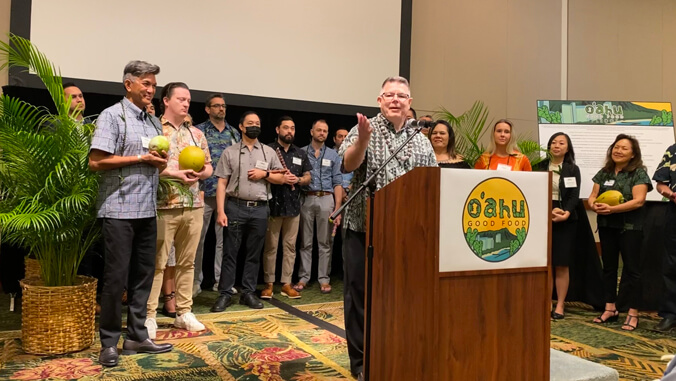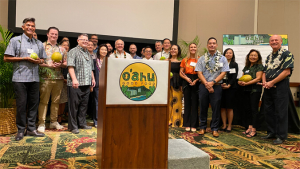
The Oʻahu Good Food Pledge—signed by government leaders and representatives from more than 20 hotels and restaurants, including a University of Hawaiʻi at Mānoa’s School of Travel Industry Management faculty member—builds on previous research and community efforts by several UH experts.

Professor Jerry Agrusa was one of the leaders who signed the pledge, committing to buy more from local farmers. Experts said this is the next step forward in growing more fruits, vegetables and proteins in Hawaiʻi and reducing the amount of imported food, which currently stands at 85% of all food consumed in the islands.
Agrusa spoke alongside Honolulu Mayor Rick Blangiardi, Hawaiʻi Lt. Gov. Sylvia Luke and Kahala Hotel General Manager Joe Ibarra. The pledge signing was held prior to the Oʻahu Good Food Show at the Hawaiʻi Convention Center on February 7. The event connected hotels with local farmers and entrepreneurs to create new opportunities for local farmers to sell to influential hospitality buyers.
UH tourism, ag research
Agrusa was invited to speak at the event because of his continued support of regenerative tourism. He published research papers on tourists’ willingness to pay more for locally-sourced foods in Hawaiʻi and residents’ views on regenerative tourism.
“I believe the results of our study have validated to local restaurants and hotels that tourists are willing to pay and pay more for locally grown products, and that being sustainable does matter and tourists are willing to pay for it,” Agrusa said. “There is an old saying ‘Put your money where your mouth is.’ The results of our study confirm that for the U.S. mainland tourists visiting Hawaiʻi.”
The Oʻahu Good Food purchasing program is engaging with key partners from government and private entities to facilitate purchasing and procurement of locally, sustainably and equitably produced food. The program is a product of the Transforming Hawaiʻi’s Food System Together initiative, which several UH faculty members are a part of, including UH West Oʻahu Assistant Professor of Sustainable Community Food Systems Albie Miles. This initiative aims to build statewide capacity and pave the way for more sustainable and resilient food systems, especially in times of crises.
The Oʻahu Good Food Show is focused on supporting the local agriculture and food industry, which aligns with one of the actions in the community-based Oʻahu Destination Management Plan (DMAP). The Oʻahu DMAP was developed by the Hawaiʻi Tourism Authority in partnership with the City’s Office of Economic Revitalization, the Oʻahu Visitors Bureau and other sectors and government agencies that voiced the importance of our tourism industry prioritizing “buying local.”
“For every dollar spent on local food in Hawaiʻi, there is a return of $1.60 to the local economy,” Blangiardi said. “That’s an investment worth making. I am most appreciative that the hospitality industry is stepping up to the local food plate to help improve Oʻahu‘s economy.”
The School of Travel Industry Management is housed in the Shidler College of Business.

